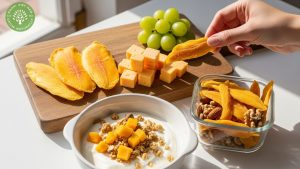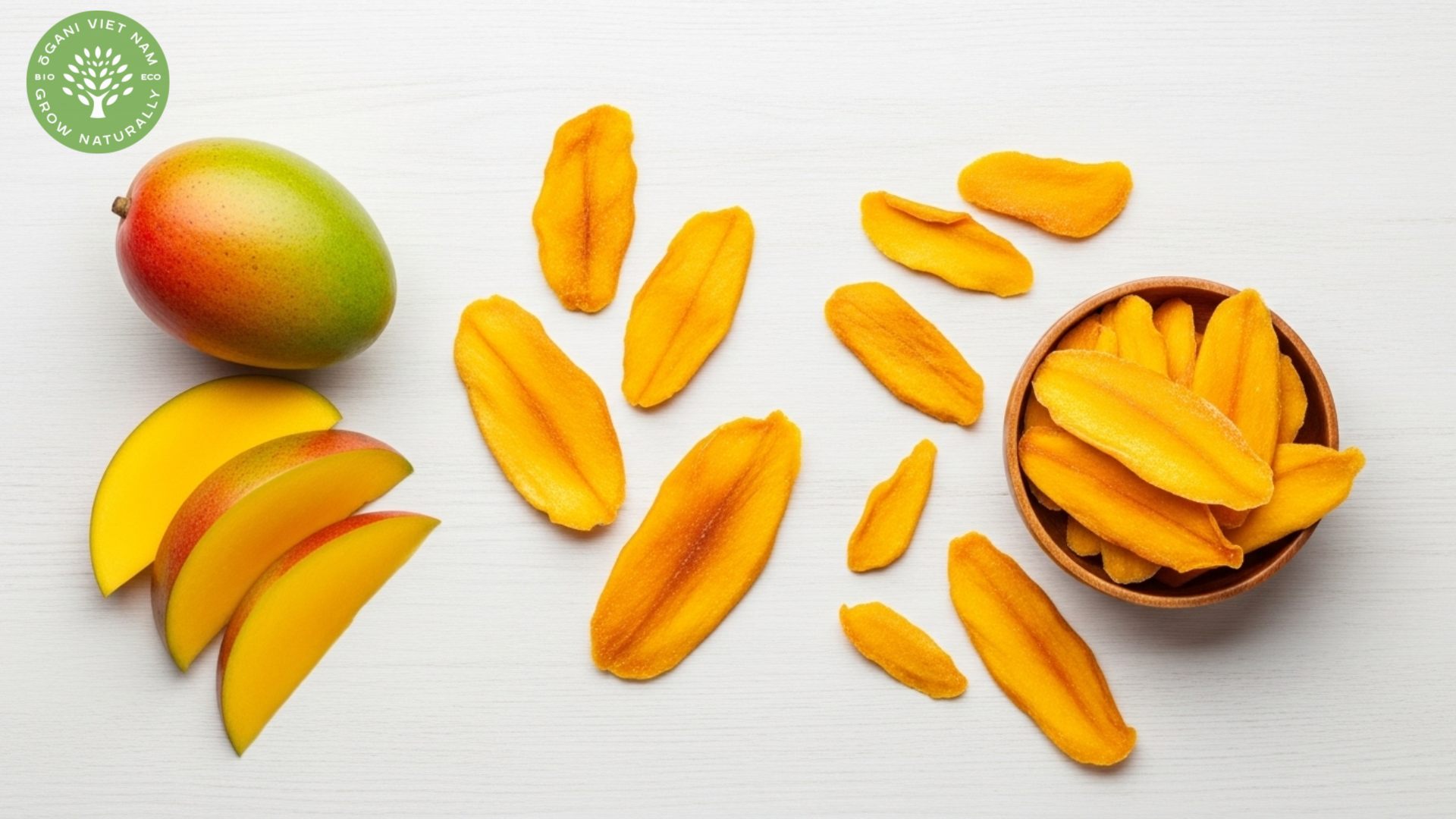Yes, is dried mango a healthy snack when consumed in moderation. At Ogani VN, we believe dried mango offers genuine nutritional benefits with vitamins, fiber, and antioxidants, but understanding proper portions and quality matters for making it truly health-conscious.
Is dried mango a healthy snack nutritionally
Dried mangoes aren’t just candy masquerading as health food – they’re genuinely nutritious options when you’re wondering is dried mango a healthy snack. When fresh mangoes undergo the dehydration process, the water content reduces but essential nutrients become concentrated.
A single serving of dried mango provides substantial vitamin A, supporting eye health and immune function. The vitamin C content remains significant even after drying, though slightly reduced from fresh fruit. We’ve noticed many customers appreciate how these chewy strips deliver more nutrients per bite compared to processed snacks, making is dried mango a healthy snack a resounding yes for mindful snackers.
The fiber content in dried mango supports digestive health and helps maintain steady blood sugar levels. Unlike refined sugar treats, the natural fruit sugars come packaged with dietary fiber that slows absorption. This makes dried mango a more balanced energy source than typical candy alternatives.
The sugar content reality check
Natural vs. added sugars in dried mango
When evaluating is dried mango a healthy snack, the primary concern revolves around sugar concentration. During dehydration, natural fruit sugars become highly concentrated – what was spread across a whole fresh mango gets condensed into smaller dried pieces.
Quality dried mango contains only natural fruit sugars without added sweeteners, which helps answer is dried mango a healthy snack positively. However, some commercial brands add extra sugar or corn syrup, significantly increasing the caloric load and affecting whether is dried mango a healthy snack for your specific dietary needs. We always recommend checking ingredient lists for “mango” as the only ingredient.
Portion control guidelines

A standard healthy serving equals about 1/4 cup or roughly 40 grams of dried mango daily. This portion provides beneficial nutrients without excessive sugar intake. Many people unconsciously consume much larger amounts because dried fruit seems “lighter” than fresh fruit.
Compared to fresh mango, you’re getting about 4-5 times the sugar concentration in the same volume. This concentration factor explains why moderation becomes crucial for maintaining dried mango as a genuinely healthy choice.
Health benefits that make the difference
Antioxidant powerhouse properties
Dried mango contains beta-carotene, vitamin E, and polyphenols that combat oxidative stress in your body. These antioxidants support skin health, reduce inflammation, and may lower disease risk when part of a balanced diet.
The carotenoids in dried mango convert to vitamin A, essential for maintaining healthy vision and supporting immune system function. Research suggests these compounds may help protect against age-related eye conditions.
Digestive and energy benefits
The fiber content promotes healthy gut bacteria growth and supports regular bowel movements. Unlike processed snacks that spike blood sugar quickly, dried mango’s fiber helps moderate sugar absorption.
For active individuals, dried mango provides quick energy through natural fruit sugars. The potassium content supports muscle function and helps maintain proper hydration balance during physical activity.
Is dried mango a healthy snack compared to alternatives

When weighing is dried mango a healthy snack against other options, context matters significantly. Compared to candy bars or chips, dried mango offers superior nutrition with vitamins, fiber, and minerals.
Against fresh fruit, dried versions are more calorie-dense and sugar-concentrated but offer convenience and longer storage life. Fresh mango provides better satiety and hydration, while dried versions excel for portability and shelf stability.
Nuts and seeds generally provide better protein and healthy fats, making them more balanced snack options. However, dried mango satisfies sweet cravings more effectively than savory alternatives while still delivering meaningful nutrients.
Smart consumption strategies

Choose organic, unsweetened varieties when possible to avoid added sugars and preservatives. Read ingredient labels carefully – quality dried mango should list only “mango” without additional sweeteners or sulfur compounds.
Pair dried mango with protein-rich foods like nuts or yogurt to create more balanced snacks. This combination helps slow sugar absorption and provides longer-lasting satiety than eating dried fruit alone.
Store dried mango properly in airtight containers to maintain freshness and prevent spoilage. Consider portioning into small containers to avoid unconsciously consuming excessive amounts during busy days.
Frequently Asked Questions
How much dried mango can I eat daily? Stick to about 1/4 cup (40g) per day to balance nutrition benefits with sugar intake. This portion provides vitamins and fiber without excessive calories.
Is dried mango better than fresh mango? Fresh mango offers better hydration and satiety, while dried mango provides convenience and concentrated nutrients. Both have places in healthy diets when consumed appropriately.
Can diabetics eat dried mango? Diabetics should consume dried mango cautiously due to concentrated natural sugars. Consult healthcare providers and monitor blood sugar responses when including any dried fruits.
Does dried mango help with weight loss? Dried mango can support weight management when eaten in proper portions as part of balanced diets. The fiber content helps with satiety, but calorie density requires mindful consumption.
What should I look for when buying dried mango? Choose products with “mango” as the only ingredient, avoiding added sugars, sulfites, or preservatives. Organic options reduce exposure to pesticide residues.
Making dried mango work in your healthy lifestyle
Is dried mango a healthy snack? Absolutely, when you choose quality products and practice portion control. At Ogani VN, we’ve seen how dried mango can satisfy sweet cravings while providing genuine nutritional value through vitamins, fiber, and antioxidants.
The key lies in treating dried mango as a concentrated fruit serving rather than unlimited munching food. By limiting portions to 1/4 cup daily and choosing unsweetened varieties, you transform this tropical treat into a legitimately healthy addition to your snacking rotation.
Ready to make smarter snacking choices? Explore our selection of premium organic dried fruits and discover how quality makes all the difference in your healthy lifestyle journey.
Read more:
- Organic Dried Mango: Your Complete Guide To Healthy Snacking
- How to Store Dried Mango & Maximize Shelf Life (Pantry, Fridge, Freezer)
- Dried Mango vs Freeze‑Dried Mango: Nutrition, Texture & Best Uses
- How to Rehydrate Dried Red Dragon Fruit (3 Methods) + What to Make with It
- Is Dried Mango A Healthy Snack? The Complete Truth Revealed


